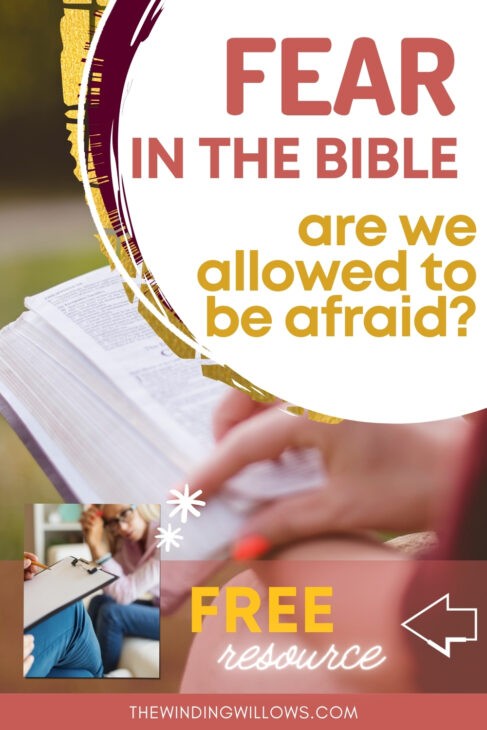There’s a popular misconception that the Bible uses the phrase “fear not” 365 times.
While it may not be true that there is a “fear not” for every day of the year, it’s certainly true that the several hundred times fear IS in there has a lot to say about the working of fear in our lives.
But is it really that simple? We just chose to ‘not be afraid’?
Yes and no.
We’re going to take a closer look at exactly what that means, but first a very brief recap of this multi-part fear series.
Being afraid
Let’s start with the basics. That is…sometimes fear is awesome. That version of fear is the one you feel before sky-diving or taking a huge chance.
The other, and less healthy version of fear can keep you from taking action. It can also keep you in a constant state of anxiety about things that may or may not need worried about.
In other words, fear spans from completely healthy to completely unhealthy.
The best way to identify what type of fear your dealing with is being 100% honest with yourself. It will take a willingness to look at your reactions to things and really think about what is behind them. And maybe a little help from a trusted advisor!
One you’ve started the conversation with yourself, you can look at whether those feelings are an immediate fear response or a more generic feeling of anxiety.
Either way, it can be helpful to understand the science behind fear in our body and the potential impacts of unmanaged fear and anxiety!
Most importantly, though, is that fear can be beat. It might always stick around in some form or another, but you can lessen its impact on your life by building your courage. It is absolutely possible to live well and still experience fear.
Is it okay to feel afraid?
How to Identify Your Fears Honestly
Are you afraid OR anxious – and does it matter which?
What Causes the Fear Feeling?
Living Well Despite Being Afraid
This page contains affiliate links, which means if you make a purchase through these links, I may receive a small commission at no extra cost to you. Read the full disclosure here.
If you need help dealing with that anxiety that fear can bring, check out online-therapy.com for their free resources. Full disclosure, there’s also a paid version, but there is SO MUCH to offer before you ever feel the need to pay!

What God says about fear
What does all of that have to do with what God says about fear, though?
First we need to look at which type of fear we’re talking about. After all, there is a specific type of fear that is expected from us, as Christians.
The direction to “fear not” is a little less simple when we consider there ARE times when fear is appropriate.
Respectful fear of God
Take a look at these two stories that clearly contrast people who have a respect (fear) for God verse someone who does not.
15 Then the king of Egypt said to the Hebrew midwives, one of whom was named Shiphrah and the other Puah, 16 “When you serve as midwife to the Hebrew women and see them on the birthstool, if it is a son, you shall kill him, but if it is a daughter, she shall live.” 17 But the midwives feared God and did not do as the king of Egypt commanded them, but let the male children live. 18 So the king of Egypt called the midwives and said to them, “Why have you done this, and let the male children live?” 19 The midwives said to Pharaoh, “Because the Hebrew women are not like the Egyptian women, for they are vigorous and give birth before the midwife comes to them.” 20 So God dealt well with the midwives. And the people multiplied and grew very strong. 21 And because the midwives feared God, he gave them families.
Exodus 1:15–21 (ESV)
These women were rewarded for their fear. If you follow the story further, you know that because of the example they set, Moses was not killed but adopted into Pharoah’s famly. Eventually he freed the Isrealites from their slavery and started them on their journey to the promised land.
All because two women feared God.
In comparison we have Pharoah, who was ping-ponging between belief and unbelief as Moses was sending the plagues.
27 Then Pharaoh sent and called Moses and Aaron and said to them, “This time I have sinned; the Lord is in the right, and I and my people are in the wrong. 28 Plead with the Lord, for there has been enough of God’s thunder and hail. I will let you go, and you shall stay no longer.” 29 Moses said to him, “As soon as I have gone out of the city, I will stretch out my hands to the Lord. The thunder will cease, and there will be no more hail, so that you may know that the earth is the Lord’s. 30 But as for you and your servants, I know that you do not yet fear the Lord God.” 31 (The flax and the barley were struck down, for the barley was in the ear and the flax was in bud. 32 But the wheat and the emmer2 were not struck down, for they are late in coming up.) 33 So Moses went out of the city from Pharaoh and stretched out his hands to the Lord, and the thunder and the hail ceased, and the rain no longer poured upon the earth. 34 But when Pharaoh saw that the rain and the hail and the thunder had ceased, he sinned yet again and hardened his heart, he and his servants. 35 So the heart of Pharaoh was hardened, and he did not let the people of Israel go, just as the Lord had spoken through Moses.
Exodus 9:27–35 (ESV)\
Pharoah did not fear God. Moses knew this and knew that more plagues were coming because he did not fear God.
The TL;DR version is this – we are to respect (fear) God and His power. Fear of God keeps on a path to live a life that is Godly.
And as you’ll see in a few paragraphs, it allows us to let go of our other fears in a way that non-believers may struggle with.
Additionally, and not to go very super-nerd on you, this type of fear is written about using an entirely different Greek word than other fears in the Bible.
This is clearly not what is being referred to repeatedly by “fear not.” So in what other way is fear discussed in the Bible?
Fear of actual or perceived danger
First off, danger is referring to anything from death and disfigurement to being alone and unloved. It covers literally every fear we may have.
If you’re particularly into studying a topic to death, you could always check out Maslow’s hierarchy of needs. Fears and anxiety fall somewhere on this chart in some form or another.
And let me tell you, there are PLENTY of verses where we, as Christians and believers, are told exactly what to do with our fears. I’m just going to give you a quick list of 10 verses about fear to consider, for the sake of this post.
- “So do not fear, for I am with you; do not be dismayed, for I am your God. I will strengthen you and help you; I will uphold you with my righteous right hand.” Isaiah 41:10
- “Do not be anxious about anything, but in every situation, by prayer and petition, with thanksgiving, present your requests to God. And the peace of God, which transcends all understanding, will guard your hearts and your minds in Christ Jesus.” Philippians 4:6-7
- “There is no fear in love. But perfect love drives out fear, because fear has to do with punishment. The one who fears is not made perfect in love.” 1 John 4:18
- “When anxiety was great within me, your consolation brought joy to my soul.” Psalms 94:19
- “An anxious heart weighs a man down, but a kind word cheers him up.” Proverbs 12:25
- “Therefore do not worry about tomorrow, for tomorrow will worry about itself. Each day has enough trouble of its own.” Matthew 6:34
- “Do not worry about your life, what you will eat; or about your body, what you will wear. Life is more than food, and the body more than clothes. Consider the ravens: They do not sow or reap, they have no storeroom or barn; yet God feeds them. And how much more valuable you are than birds! Who of you by worrying can add a single hour to his life? Since you cannot do this very little thing, why do you worry about the rest?” Luke 12:22-26
- “Be strong and courageous. Do not be afraid or terrified because of them, for the Lord your God goes with you; he will never leave you nor forsake you.” Deuteronomy 31:6
- “Jesus told him, ‘Don’t be afraid; just believe.’” Mark 5:36
- and my personal favorite: “For God has not given us a spirit of fear, but of power and of love and of a sound mind.” 2 Timothy 1:7
The fun thing about this list is there are so many different perspectives and stories for each of these verses.
You’ve got David who spent years literally running for his life. You’ve even got a family whose young daughter had just died. God told them no to fear but believe and he BROUGHT THEIR DAUGHTER BACK FROM THE DEAD.
And the point of that isn’t that we can escape death. It is that when we believe in and fear God, there should be no other fears bigger than that. Our fear of God’s power can literally work miracles.
If you’re feeling fear of danger, to pick up your Bible and read some of these stories. They WILL change your perspective on God’s ability to handle sin versus little ‘ol us.
One fear fights the other
So all of this has a point. And it is this.
God allows, even requires, that we fear Him. And in doing so, he gives us the means by which we fight the type of fear that we aren’t supposed to have. The type that is harmful to us.
And because you’re reading a discussion of what the Bible says, you’re going to get a few more verses – might as well know what it actually says, right? These ones are going to come with a little discussion, though. So buckle up and get ready for the ride!
- “Do not be afraid of them; the Lord your God himself will fight for you.” Deuteronomy 3:22
- If we fear God, we know He is capable of handling our battles for us. We do not have to fear handling them ourselves.
- “Have I not commanded you? Be strong and courageous. Do not be terrified; do not be discouraged, for the Lord your God will be with you wherever you go.” Joshua 1:9
- Again, if we fear God what is there to be afraid of if we know He’s with us? There is literally nothing that can come our way that can out-do God. This doesn’t guarantee the outcome we want, but if we place our fear in God, then it guarantees the outcome He has for us.
- “I prayed to the Lord, and he answered me. He freed me from all my fears.” Psalm 34:4
- This is a rather direct look at how we can drive out our fears with the fear of God. Fear Him, pray to Him, and he will help free you from fears.
So is it really as simple as just not being afraid?
Yes, you can not be afraid in the true sense. In the sense that you know there is someone great and more powerful than you. He is worrying about you and caring for you.
But also no. You must first fear the Lord. You must know He is powerful and great enough to take care of you and caring enough to know He will.
And for me, the mother of all control freaks, that’s the hard part! Vulnerably, I’m admitting this is where I struggle.
I KNOW in my soul that God is capable of meeting my every need. But am I willing to give up that control knowing that it might not give me the results I want?
Luckily, I’m always able to settle back to Yes. I am willing to do that. But it takes perpetual work on my part to “be still and know that [He] is God.” Psalms 46:10.
And in that way, it’s actually not easy at all! But it is easier than taking on all those fears and anxieties that are so able to consume us.
Seeking help is not a lack of faith nor a sin
One final point that MUST be made here is that seeking professional – and even medical help, for fear and anxiety IS. NOT. WRONG.
And in case you’ve been told differently by those who grew up in a church who favored this theology, let me apologize for the harm they may have done to you.
These two are not mutually exclusive.
Firstly, therapy is not a belief system. It is an educated professional – much like a doctor – who has been trained to give you tools for managing anxiety and fear. Fearing God does not mean that you cannot also get extra help. I trust that God will protect my marriage, but that doesn’t mean I’m not also going to work at my marriage.
Likewise, you can trust God to protect you and keep you and still know that counting to 10 in your head when you’re mad is acceptable.
Secondly, God regularly works miracles through modern medicine. If He is still at play in our physical health even if you see a doctor, you can guarantee the same is true for our mental health.
If you are particularly worried about reconciling therapy and the Bible, I would recommend seeking out a Christian therapist. This is not necessary, but it may help ease you into a place where you’re comfortable getting help where help is needed.
Bringing it all together
In a secular world that is increasingly hostile toward Christianity, I’ve heard it said that religion is a crutch.
That we use it to prop up beliefs and ideas that we’re not strong enough to handle on our own.
And you know what?
I agree.
I use God as my crutch EVERY. SINGLE. DAY. I literally cannot leave my bed without God.
And I wouldn’t have it any other way. Because HE wouldn’t have it any other way.
He wants us to hand our fears over to Him. Amazingly, that’s not even a guess. He told us that repeatedly and through several different people and stories through the entire Bible.
Knowing God and fearing Him can bring the relief from all our other fears that we aren’t able to handle on our own.
I’m temped to head down the path of my least favorite phrase, “God doesn’t give us more than we can handle.” But that is definitely a different post for a different day.
He ABSOLUTELY 100% WITHOUT A DOUBT gives us more than we can handle. Because His strength is made greater through our weakness. His ability to handle my fear is, quite literally, better when I am less able to handle them!
And as a believer, I can rest easy knowing that my crutch will always be there to catch me when I fall.
If you are one of the 40% of Americans who deal with anxiety, check out this awesome resource! The confidential web portal gives you access to hours of free mental health resources AND allows you to pay for access to online therapists, which is awesome during a pandemic!
Plus, if you use this link, you get a 20% discount on your first month if you decide to sign up for a plan. For those without insurance like me, this is a great and relatively inexpensive option! And trust me when I say, even the free resources are amazing!
Don’t forget it. Pin it!


